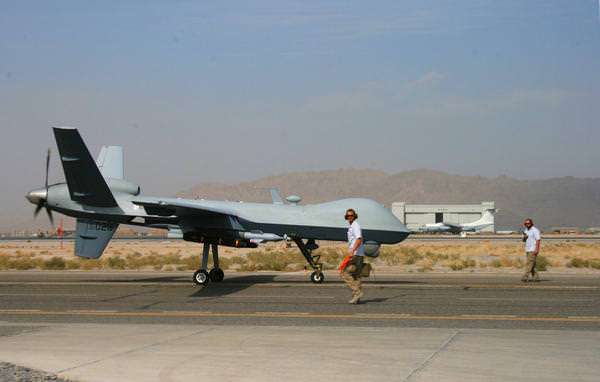It Looks Like Shifting the CIA's Drone Program to the Pentagon Won't Change Much

Yesterday the Daily Beast reported that the White House is preparing to transfer the CIA's drone program to the Pentagon. From the Daily Beast:
The move could potentially toughen the criteria for drone strikes, strengthen the program's accountability, and increase transparency. Currently, the government maintains parallel drone programs, one housed in the CIA and the other run by the Department of Defense. The proposed plan would unify the command and control structure of targeted killings and create a uniform set of rules and procedures. The CIA would maintain a role, but the military would have operational control over targeting. Lethal missions would take place under Title 10 of the U.S. Code, which governs military operations, rather than Title 50, which sets out the legal authorities for intelligence activities and covert operations. "This is a big deal," says one senior administration official who has been briefed on the plan. "It would be a pretty strong statement."
While the unnamed senior official might think that the move "would be a pretty strong statement" there are reasons to think that not much will change. As Spencer Ackerman over at Wired's Danger Room explains, reforms to the drone program require political will, not institutional changes:
If the Obama administration decides to give the U.S. military control of the CIA's drone effort, the institutional changes to the controversial global drone strikes will be minor. That's because the important leverage points over the drones — and the global, targeted-killing program they support — are political, not institutional.
Daniel Klaidman at The Daily Beast reports that President Barack Obama is nearing a decision to divest the CIA of its lethal drone fleet. According to Klaidman, the CIA will "remain involved in lethal targeting," but uniformed personnel will pull the trigger from now on. "It looks like the White House may now be preparing to launch a campaign to counter the growing perception — with elites if not the majority of the public — that Obama is running a secretive and legally dubious killing machine," Klaidman writes.
Except he'll still be running one. The CIA conducts armed drone strikes in Pakistan and Yemen, among other places. The U.S. military conducts armed drone strikes in Afghanistan, Yemen and Somalia, and has extensive airbases and support networks for drone strikes in east Africa and now in Niger. Military launchpads are often — but not always — launchpads for the CIA's drones, too. And the CIA sometimes borrows the Air Force's drone fleet. In short, the military infrastructure for the drone strikes is robust and global.
Aside from the fact that shifting the CIA's drone policy over to the Pentagon will not change the nature of the drone missions it is likely that the administration's use of drones will also not be more transparent or accountable under the change:
There's an argument that giving the military control over the drones will lead to greater transparency around them. Maybe, but not necessarily.
The congressional reporting requirements for so-called Title 50 programs (stuff CIA does, to be reductive) are more specific than those for Title 10 (stuff the military does, to be reductive). But the armed services committees tend to have unquestioned and broader oversight functions than the intelligence committees enjoy, not to mention better relationships with the committees: Witness the recent anger in the Senate intelligence committee that the CIA lied to it about its torture programs. The military is more likely than the CIA to openly testify about future drone operations, allow knowledgeable congressional staff into closed-door operational briefings and allow members of Congress to take tours of drone airbases.
But that's not to say that there will necessarily be more transparency of the military's drone programs. Much depends on congressional prerogative, rather than institutional requirements. A summary offered by a former Special Operations Command lawyer last year (.pdf), piggybacking off one from a former CIA lawyer, was: "If the activity is defined as a military activity ('Title 10?) there is no requirement to notify Congress, while intelligence community activities ('Title 50?) require presidential findings and notice to Congress." (For a good overview of how how the military can compartmentalize and limit access to information on its activities, including to Congress, read this blog post from Robert Caruso.) "Moving lethal drone operations exclusively to DOD might bring benefits. But DOD's lethal operations are no less secretive than the CIA's, and congressional oversight of DOD ops is significantly weaker," former Justice Department lawyer Jack Goldsmith tells Klaidman. Mieke Eoyang, a former House intelligence committee staffer, tells Danger Room that oversight "depends on the the level of interest of the committee chairman on the Title 10 [military] side. It depends on how detailed he wants to get, down in the weeds."
Read more from Reason on drones here.


Show Comments (61)